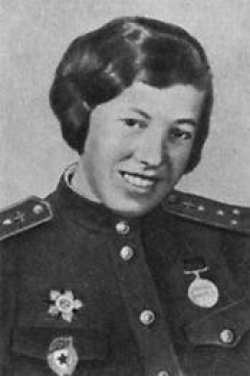Zinaida Gorman was born in 1910 in the village of Dranukha in the Mogiliov Province (now in Belarus). She spent her childhood in that village. At the age of 23, Gorman began working for the NKVD (one of the precursors of the KGB). At the time of the outbreak of the Soviet-German War in late June 1941, Gorman worked in the department of military counterintelligence. Soon thereafter, she was appointed to the post of supervisor (oberupolnomochennyi po obsluzhivaniyu) of the 588th Night Light-Bombing Aviation Regiment (which became the 46th Guards Night-bombing Aviation Regiment). That was the famous all-female regiment where all positions – pilots, navigators, mechanics, and technicians – were exclusively staffed by women. The women would fly out at night in small planes referred to as "kukuruzniki" (corn dusters), approach their targets, and then – to reduce the noise made by their aircraft – they would switch off the engines and drop their bombs at a very low altitude. The German soldiers nicknamed them "night witches." The Soviets referred to them humorously as "Dunka's regiment", in honor of their commander Evdokiia (nicknamed Dunka) Bershanskaia.
This regiment, in which Captain Zinaida Gorman served, took part in the battles for the Caucasus, and in the liberation of Kuban, the Crimea, and Belorussia. It later fought over Polish territory, meeting V-E Day in Germany. During the war, Zinaida was awarded the Order of the Patriotic War, 2nd Class, and a number of medals.
Her entire family – including her young son, whom she had left with her parents in early summer 1941 – all perished in Belarus in the Holocaust.
From the Memoir of the "Night Witch" Nadezhda Popova, a Hero of the Soviet Union
Zinaida Gorman was a good NKVD-ist, in the sense that she did not instigate a "witch hunt" among her fellow "night witches", as was the case in many units of the Red Army. Marshal of Aviation Aleksandr Iefimov, Twice Hero of the Soviet Union, recounted the following striking incident in an interview with the author. In 1944, as the war was irresistibly moving westward, an ace pilot who had shot down about fifteen of Hitler's airplanes was mercilessly put up against the wall for an inappropriate joke: while entering a dugout to join his fellows, he had humorously greeted them with the words "Heil Hitler, Slavs!"… Other security organs would clamp down on similar "atrocious incidents" that took place in "group 122" of the 558th, later known as the 46th Women's Aviation Regiment."
From the Memoir of Irina Rakobolskaia, former head of headquarters of the Regiment
After the liberation of Belorussia, Zina [Zinaida] Gorman, who worked at our headquarters, went to visit the village where her father worked as a collective farmer. She had sent her young son there for the summer in June 1941. She returned grief-stricken. All the Jews [there] had been exterminated. Some had been shot, but most had been buried alive… When she was able to speak, we could not bear what she had to say.
Zina's husband, Sasha, fought in the infantry somewhere in our vicinity. After the war, they adopted a two-year-old boy… "He looks so much like Sasha," she would say. She could not have children."







